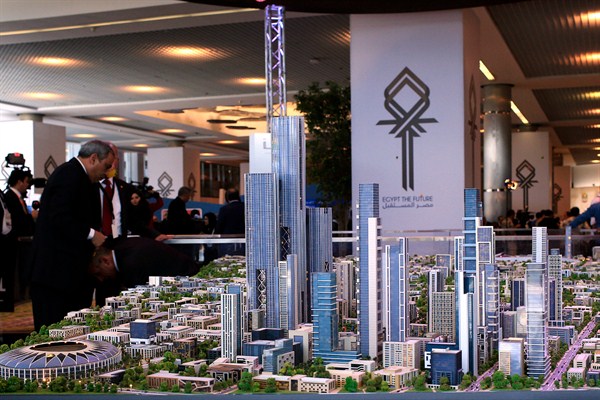On Feb. 7, officials in Egypt’s Ministry of Housing abruptly announced that a Chinese company had backed out of a $3 billion agreement to construct the first phase of a new Egyptian capital in the desert 30 miles east of Cairo. The China State Construction Engineering Corporation (CSCEC), a government-backed general contractor that has taken on megaprojects around the world, had secured a loan to cover the costs of building the wildly ambitious new capital, which has been criticized as a boondoggle. But it was unable to agree with the Egyptian government on an exact price per square meter to include in the final contract. While another Chinese company still plans to participate in the second phase of the new city, the initial construction will now be the sole responsibility of local Egyptian contractors.
The proposed capital was supposed to be a grandiose showcase for Egypt and its general-turned-president, Abdel Fattah el-Sisi. When he unveiled the project in March 2015, el-Sisi promised to build a new city seven times larger than Paris that could house up to 5 million residents. Architects drew up plans to fill a desolate patch of Egyptian desert with 40,000 hotel rooms, one of the world’s largest airports, a theme park and a central monument taller than the Eiffel Tower. The new city’s official website promises nothing less than to spark an “Egyptian renaissance.” For all that, construction costs for the capital might ultimately total as much as $300 billion.
The collapse of the CSCEC deal is a bad sign for el-Sisi’s ability to attract foreign investment that can stimulate Egypt’s flagging economy, but it does not necessarily mean that the project as a whole has failed to produce the desired result. The new capital was always more about perception than reality. The goal is to convince both Egyptian citizens and foreign observers that el-Sisi’s regime has a vision for a bold transformation of Egyptian society, modeled on China’s own trajectory.

